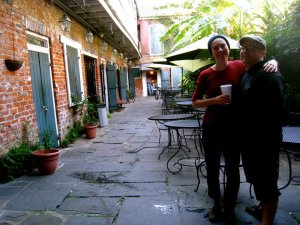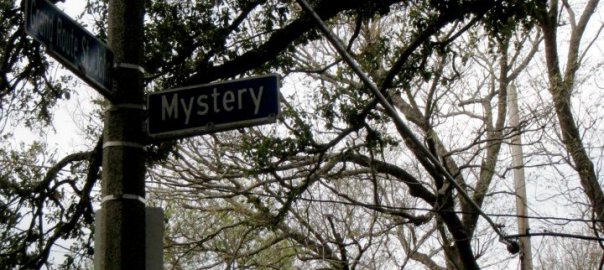by Sarah
Michaela O’Connor Bono and I met when we were both Zen students at Tassajara Zen Mountain Center the summer of 2006. Michaela was coming right out of post-Katrina New Orleans, and I was just touching down from years of human rights work in Colombia; we bonded immediately and have been friends ever since.
I just returned from ten days in New Orleans working with Michaela, her partner Koji, and their Zen Center. In this interview, I talked with Michaela about their growing Buddhist center, building a community, and how it is to work with your partner on your life project.

Michaela is now a resident priest at Mid City Zen in New Orleans, and has been practicing Zen Buddhism since 2003. After evacuating New Orleans following Hurricane Katrina, she lived and trained at both Tassajara and Green Gulch Farm Zen Centers. Michaela was ordained as a Soto Zen priest in September 2010. Besides leading a Buddhist center, she is active in restorative/transformative justice.
I was in New Orleans to help Mid City Zen set up some systems so they can do their work more easefully. As we worked together to build the structure of their organization I found myself thinking a lot about structure. When I’m at home, our tiny house build feels very tangible to me–it’s about boards and beams, nails and screws. But out in New Orleans, I was able to see the big picture again, and remember that this build is not just about building a house; it’s about building our life together.
While we talked, Michaela made lunch for us (black-eyed pea salad with dill, sautéed kale, grilled cheese) and I sat at the kitchen table taking notes.
Sarah: What are you guys doing here at Mid City Zen in New Orleans?
Michaela: We’re trying to balance religious life with secular life, for our own benefit and the benefit of everybody else we talk to. Right now we’re operating a zendo out of our house, offering daily meditation, classes, and visiting teachers. We’re simultaneously building a temple from the ground up, which will offer more of those things, and a residential life. Having left the cozy, loving, and disciplined monastic Zen practice lifestyle that supported us for many years, we wanted to see if we could take that into New Orleans.
Which aspects did you want to take with you to New Orleans?
The supportive community and the benefits of Zen practice. I wanted to share those things outside of the monastic setting.
What kind of benefits of Zen practice?
Seeing your own thoughts, mind, and heart, and being grounded, And just having a practice.
What does community mean to you? What are the things from your previous experience that you’re trying to bring to life here?
Sharing resources, sharing common goals, supporting one another to have a spiritual practice. It’s really hard for me to achieve anything on my own. So it’s important to find a way to work together and be in harmony with each other so that it supports all of our spiritual practice. That’s why people go to a church or go to a temple. People can have their own spiritual practice but it’s more supportive when it’s in a group with others.
Is supporting spiritual practice the central thing that community does for you?
Community is an alternative to the alienation that a lot of people feel in their daily lives, and to the highly individualized way we sometimes live our lives. It’s about sharing a life together as opposed to everybody living separately and doing things separately.
Any thoughts about community in New Orleans specifically?
Well, it’s been quite an adventure to try to promote discipline in this city. There are so many more fun things to do than sit still. But I think people really appreciate taking a break from the chaos to check in with themselves and to meet other people who are interested in meditation. I had always had the dream of having a zendo here but doing it with a partner is amazing. I can’t imagine doing it on my own.
Tell me more about working with your partner.
Even right now, Koji just went away for three weeks and I notice the difference; it’s so much easier to share the responsibility. Also there’s that same thing about not being able to do things on your own, being in a relationship is like a mini-community within a community.
Can you put into words how it’s different to do something like this with your partner rather than with someone else?
There’s two aspects of it–what’s it like to be in a relationship when you have a shared goal versus when you don’t? And–what’s it like to work on a project with your partner as opposed to with not-your-partner.
Yeah, I am really interested in both of those aspects.
What’s it like to be in a relationship and have a shared goal? I don’t want to sound negative but it’s really hard. You have to figure out a way to work with each other and not let your relationship dynamics get too much in the way. On the other side, knowing each other’s dynamics so thoroughly can actually help your working relationship. Everything that’s a challenge about being in a relationship and working together is also a benefit. The things you know about your partner, how you’ve communicated in your relationship, can help you communicate about the project you’re working on. You are always learning how to communicate–communication is the biggest thing, in the relationship or the project, at least for us.
It’s tricky when you ask someone to do something for the project, you have to be aware, you have to check, “Why am I asking them to do that and how am I asking?” You need a lot more awareness. And, it’s a real joy to have a partnership where you have a shared goal. A lot of couples come to that point of, “Are we compatible? Do we have a shared idea of what our life is supposed to be like?” Some people answer that with having children or living in a certain place or a job. For us it’s really amazing because it’s a shared spiritual path, it’s a shared location path, and it’s a shared existential path: why we do what we do.
That is really great.
Of course we have discussions about the details of what that will look like but we don’t have to spend too much time wondering what’s the most important thing.
Or negotiating what the thing is.
Right. We have this really solid amazing tradition that’s been handed down to us for thousands of years, and we can rely on that and trust that, and we also have to make it our own. And I think we’re doing that in our relationship as well. We have a shared understanding of how to treat each other, how we can study ourselves and take responsibility for our own minds and hearts, and take care of each other. That understanding comes directly from our tradition and our practice. And we have to make that our own too, “What does that look like?” But we have a solid, ancient support system.
I feel that in my relationship too.
It’s amazing. I can’t imagine it any other way. And a side note, I have this constant faith and trust that my partner is always working on what they need to be working on, in the personal, internal… that they’re always going to be self-reflecting and taking responsibility. I don’t ever question that, which is very different than in other kinds of relationships I’ve been in.
We had that conversation the other day about how you and Koji are building a Zen temple and Joseph and I are building a tiny house and they seem very different, but there is actually this similarity. We are each doing what is true to us, somehow our paths are sprouting from the same place.
It’s setting up a place from which we’ll do the work in the world that we need to do. It offers us an unconventional alternative to the conventional options. You can use the tiny house in many ways, especially since you’re building it off the grid. You can take it to where you want to go which is important to how you want to live. And for us we want to live sharing our lives with a larger community, with more people, so we have to set up the space we can do that.
I think what I’m trying to get at also is how we are each responding to our different causes and conditions. And the response looks different because the conditions are different, but we are actually doing the same thing, which is to find what is truest and deepest, what is at the root, and to try to prioritize that. And for you that is being in New Orleans, living with other people, and sharing a Zen practice together. And for us that looks like financial freedom which allows for creative life, mobility for now, and also having a home. So those responses look different, but for each us they are the true root response to our conditions. It sounds obvious now that I said it, but I actually just realized the similarity being here with you. I had thought we were doing very different things.
Yes.
If you want to learn more about Michaela and Koji’s project, please visit: midcityzennola.blogspot.com. Their website is in development, so check back often for updates.


You must be logged in to post a comment.